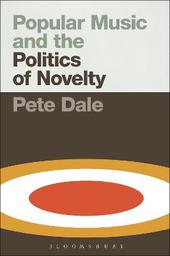
|
Popular Music and the Politics of Novelty
Hardback
Main Details
| Title |
Popular Music and the Politics of Novelty
|
| Authors and Contributors |
By (author) Pete Dale
|
| Physical Properties |
| Format:Hardback | | Pages:240 | | Dimensions(mm): Height 229,Width 152 |
|
| Category/Genre | Theory of music and musicology
Rock and Pop |
|---|
| ISBN/Barcode |
9781501307041
|
| Classifications | Dewey:781.64 |
|---|
| Audience | | Professional & Vocational | |
|---|
|
Publishing Details |
| Publisher |
Bloomsbury Publishing Plc
|
| Imprint |
Bloomsbury Academic USA
|
| Publication Date |
7 April 2016 |
| Publication Country |
United States
|
Description
Popular music, today, has supposedly collapsed into a 'retromania' which, according to leading critic Simon Reynolds, has brought a 'slow and steady fading of the artistic imperative to be original.' Meanwhile, in the estimation of philosopher Alain Badiou, a significant political event will always require 'the dictatorial power of a creation ex nihilo'. Everywhere, it seems, at least amongst commentators of a certain age and type, pessimism prevails with regards to the predominant aesthetic preferences of the twenty first century: popular music, supposedly, is in a rut. Yet when, if ever, did the political engagement kindled by popular music amount to more than it does today? The sixties? The punk explosion of the late 1970s? Despite an on-going fixation upon these periods in much rock journalism and academic writing, this book demonstrates that the utilisation of popular music to promote political causes, on the one hand, and the expression of dissent through the medium of 'popular song', on the other hand, remain widely in practice today. This is not to argue, however, for complacency with regards to the need for expressions of political dissent through popular culture. Rather, the book looks carefully at actual usages of popular music in political processes, as well as expressions of political feeling through song, and argues that there is much to encourage us to think that the demand for radical change remains in circulation. The question is, though, how necessary is it for politically-motivated popular music to offer aesthetic novelty?
Author Biography
Pete Dale is a Senior Lecturer in Popular Music at Manchester Metropolitan University, UK.
Reviews[The book] challenges the reader and makes them think - and that's always a good thing ... Dale certainly wants to make the world a better place - and in writing this book he has made his own, distinctive, contribution to that. * Popular Music * Dale takes a fresh approach by investigating the role of novelty in popular music and its influence on social and political agency ... This is a well-researched book that uses musical and social analyses in order to better understand music's potential role in social change and social justice. * Reinvention: An International Journal of Undergraduate Research * Pop music has always foregrounded novelty. But how exactly should we understand this quality, in music or more generally? Today especially, the question whether anything ever really changes seems particularly pressing. To investigate these issues, I can think of nobody better qualified than Pete Dale, who, as well as possessing all the necessary skills of musical, cultural and political analysis, has himself been making and promoting cutting-edge music for years. * Richard Middleton, Emeritus Professor of Music, Newcastle University, UK * Popular Music and the Politics of Novelty is an engaging and provocative book. It challenges conventional wisdom about the relationship between music and politics, and more particularly that between novelty and radicalism. Pete Dale is himself an entertaining guide to an array of theories, case studies and historical moments. As a result, the reader is treated to a bracing and stimulating journey. * John Street, Professor of Politics, University of East Anglia, UK * Providing a novel reading of a contentious question and bringing together a range of thoughts and ideas in an accessible way, Popular Music and the Politics of Novelty is a timely assessment of the debate on politics and music. This volume moves from theoretical musings to analyses of popular music in a way that is both stimulating and exciting, and will be a major contribution to the way people think about and act upon the relationship between music and politics. * Matthew Worley, Professor of Modern History, University of Reading, UK *
|